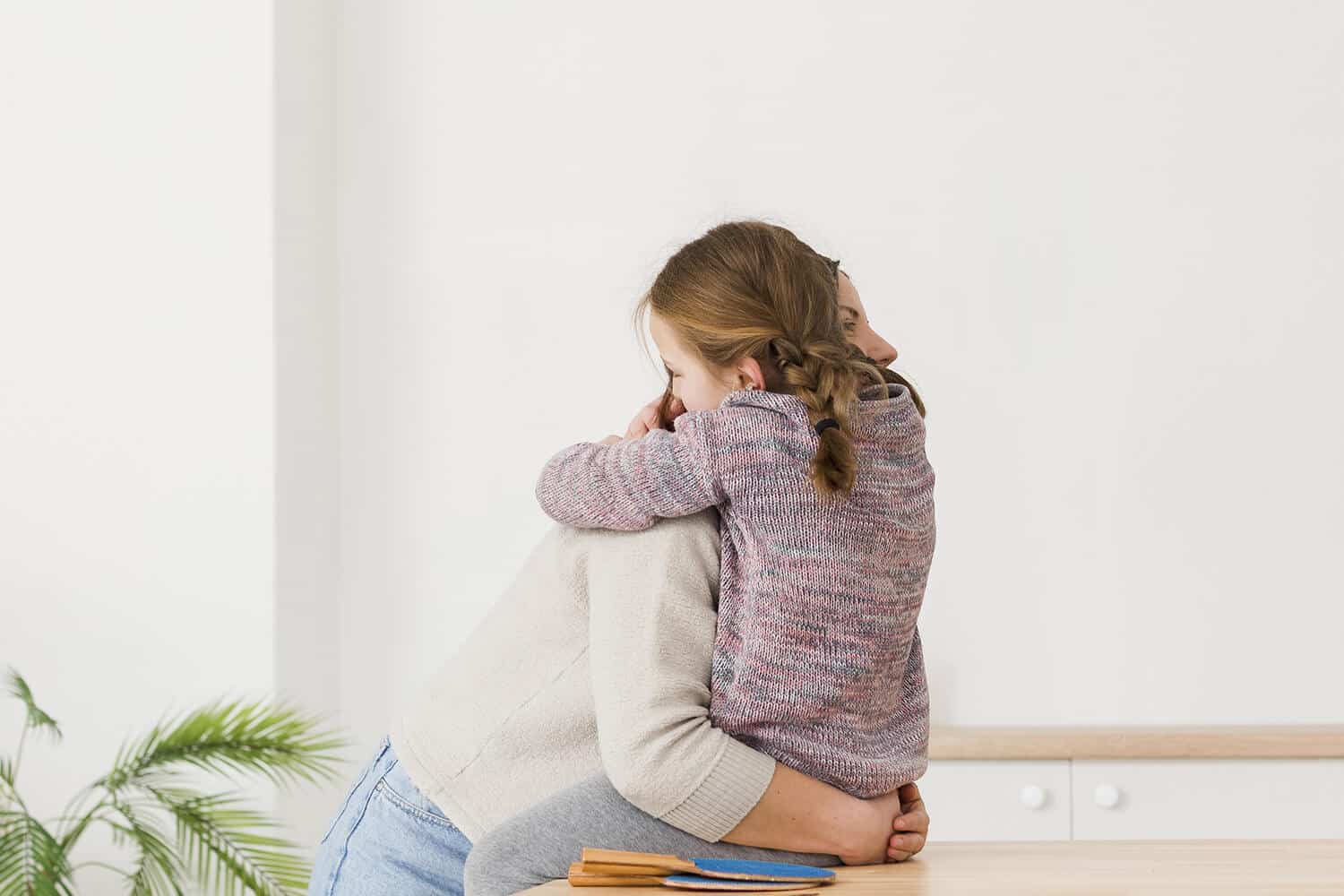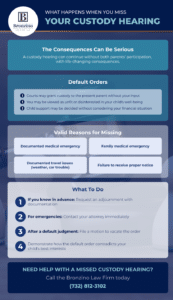The Impact of Missed Custody Hearings: Understanding Default Orders
 A mother sits anxiously in the parking lot across the street from the courthouse, knowing she is due in custody court in a few minutes, but she is paralyzed with fear. What if the judge rules against her because she says the wrong thing? What if her ex wants to have full custody, and she won’t see her children often? The real problem is if she decides not to attend the hearing, her absence could affect the judge’s decisions.
A mother sits anxiously in the parking lot across the street from the courthouse, knowing she is due in custody court in a few minutes, but she is paralyzed with fear. What if the judge rules against her because she says the wrong thing? What if her ex wants to have full custody, and she won’t see her children often? The real problem is if she decides not to attend the hearing, her absence could affect the judge’s decisions.
A custody hearing can continue without both parents’ participation, relying solely on the present parent’s evidence and input, and can have life-changing consequences for everyone involved. Some judges may enter a default decision that grants custody to the participating parent unless and until the absent parent submits a motion to modify custody.
The courts can consider a parent’s failure to attend a custody hearing as defiance of the law, a lack of commitment to their family, or disinterest in their child’s well-being. Skipping a custody hearing can raise concerns about a parent’s willingness to accept the court’s decisions and abide by its instructions.
Custody Determinations: How Family Courts Make Decisions
Held in family court, a custody hearing determines custody guidelines regarding the children’s upbringing, time spent with each parent, and under what conditions. It formalizes custody arrangements between divorced or unmarried couples. Witnesses such as relatives, therapists, teachers, and other professionals may be necessary to come to the best conclusions.
There are several types of custody. Legal custody refers to a parent or guardian having the power to make the child’s educational, health, and religious decisions. It can be shared or given to one parent exclusively, which is known as sole custody. Physical custody refers to the child’s primary residence. The other parent is the NRP, or non-residential parent in a shared custody situation. Joint custody is similar to shared custody, but the parenting time is split nearly 50%, as they share legal custody. The New Jersey custody courts prefer sharing custody, as studies have shown that children respond more positively when they spend time with both parents.
New Jersey’s custody process should not be done without legal representation. To begin, a parent files a custody complaint in the custody court. Some couples have already decided on a custody plan and are seeking its ratification. Parents who disagree are usually mandated to mediation to hammer out an agreement. If mediation is unsuccessful, litigation follows. The court may request further evidence, such as home studies or psychological evaluations of the children, the parents, or both. A final custody order is handed down, stipulating the boundaries and requirements regarding custody. Any changes the parents or guardians wish to make after the final decision must be made through a motion requesting modification. None of the steps in this process should be attempted without a lawyer.
When deciding custody arrangements, New Jersey is one of many states that rely on the “best interests standard” (N.J.S.A. 9:2-4(c)), a list of factors taken into account by the court to determine the ideal custody situation for the child. Every case is different and is scrutinized to protect the child’s well-being. Some of these factors are the ability of the parents to communicate clearly and act cooperatively to provide a safe environment for their child, their individual relationship with the child, geographical proximity to the child’s school or social groups, employment, residential infrastructure, and the parent’s mental and physical health. If step-siblings are involved, the court will consider the child’s relationship to them and the step-parent. If a child is within an age of reason and maturity, the custody courts may request input as to which parent they would prefer to live with. Domestic violence or other criminal issues will also be factored into a custody decision.
The Impact of Non-Appearance at Custody Hearings
When a parent fails to appear at a child custody hearing, the court may grant the other parent custody, parenting time, and support requests without input from the absentee parent, known as a default order. Moreover, the court may view the absentee parent as irresponsible or unfit. The appearing parent could be granted sole custody or a plan that best suits them. The judge may decide the child support amount based only on the financial information given, without regard to the absent parent’s financial situation. When an absentee parent loses the opportunity to present their case, they are at a distinct disadvantage regarding the court’s decision-making process.
Turning over a default order is challenging. If you miss your custody hearing, you must prove a valid reason for missing the hearing to have it vacated. You must also demonstrate how the default order goes against the child’s best interests. Judges are reticent to overturn court orders unless there is a compelling reason.
Valid Reasons For Missing a Hearing and Potential Remedies
There are valid reasons for missing a hearing. If you have an accident requiring medical attention, a medical emergency (heart attack, stroke, hypoglycemia, systolic blood pressure, or other incapacitating ailments) that medical professionals document is obviously a valid reason. Also accepted are medical emergencies regarding family members. When properly documented, unforeseen circumstances such as inclement weather, a car crash or mechanical failure are considered valid excuses. A failure to receive proper notice of the hearing or mistaken information given by the courts can also be valid reasons.
If you know you are going to miss your hearing ahead of time, you can make a formal request to the court requesting an adjournment, citing the reason, and providing documentation for your request. If there is an emergency, contact your attorney immediately, as they can help you with this process. Some judges will grant adjournments more leniently than others, but every adjournment is evaluated on a case-by-case basis. Your attorney may also request that the other parent sign a stipulation, acquiescing to the request for another court date.

Legal Consequences of Custody Order Violations
Custody orders are enforced, whether they are default orders or the standard variety. Failure to obey a custody order could result in a complete loss of custody, a reduction in parenting time, fines, and court costs for further necessary hearings to address any issues. If necessary, the court may charge the offending parent with a contempt of court order and assess fines.
Free Resource: What Happens When You Miss Your Custody Hearing
When Court Goes On Without You: Call Our NJ Family Lawyers Today to Address Your Missed Hearing
By now you surely have seen why having a lawyer in a custody situation is imperative. Your lawyer can prepare your motions and evidence for your custody hearing. They will secure the witnesses and proof, building a strong case and a decision in your favor.
New Jersey law affirms the rights of parents to spend time with their children, make decisions regarding their children’s upbringing, and have an active role in their children’s well-being. Your attorney will protect your rights and hold the courts responsible for providing you the opportunity to spend every moment possible building a relationship with your children. New Jersey’s custody laws are complex. You need an attorney who knows the law and can protect your parental rights. We will build your case strategically to show the court your abilities as a parent and a cooperative co-parent. By allowing the Bronzino Law Firm to handle your case, you avoid costly mistakes such as procedural errors or a lack of supporting evidence.
If you have a default judgment that you want to modify or are absent from your custody hearing, we can present the court with the necessary information and documentation to overturn an unsatisfactory default judgment. Your children are your most precious gift and they deserve to have you in their lives, making memories and building relationships. We proudly serve clients throughout Ocean and Monmouth County, including in Asbury Park, Howell, Jackson, Freehold, Brick, Manchester, Point Pleasant, Middletown, and Berkeley. If you have questions about your custody situation or any other legal matter, and would like a consultation, call us today at (732) 812-3102 or reach out to us online.








